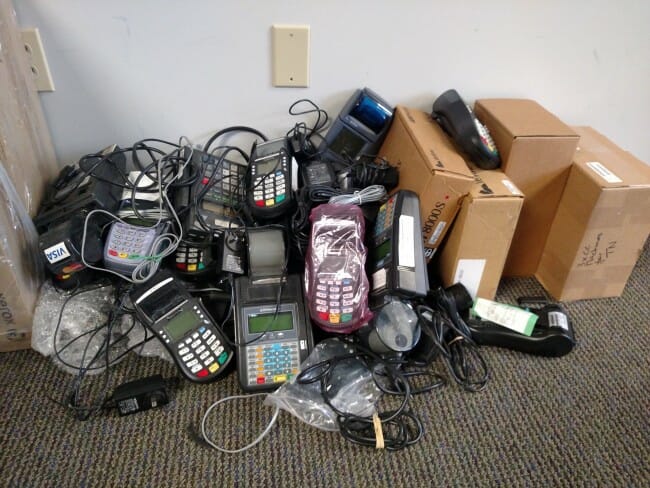Chip Card Transition, And Life as A Small Business Owner
Well, per the new rules, we replaced all of our old credit card readers (dozens) with new ones that can take chip cards (EMV). Here is the bone pile of all the old technology, many of which were bought less than 2 years ago:
This illustrates both the best and worst of running one's own company.
The bad: As CEO, I am actually futzing with distributing credit card terminals to the field and collecting the used ones to be recycled.
The good: I have total control. I was just in Washington DC, and in one meeting the National Park Service was there talking about some multi-year, multi-million dollar study to figure out their electronic payments "strategy" at their parks. My payments strategy discussion went literally something like this:
Merchant guy: Do you want to pay an extra $100 for the terminals to accept NFC payments (e.g. Apply pay, Android pay).
Me: Um, sure seems like the future. Does it cost more to clear a transaction that way?
Merchant guy: no
Me: They yes, I'll take it.
Now, we can take smart phone payments at dozens of public parks my company operates, all decided and implemented in about 30 days.
By the way, I am amazed at how many large companies like CVS appear to have the chip card readers but the store clerk tells me that they are not turned on yet whenever I try to stick my card in that slot (for those of you who don't know, the chip side goes head into a slot like an ATM slot on the front). October 1 was the date that there was a liability shift, where merchants bear more liability for fraud if they don't take the chipcards. Not sure how I was able to get this done in my little company but they can't manage it.
I was told by one person at CVS, a store manager but they may be off base, that they don't take the chip cards yet because they take longer than swiping. This seems dumb. First, many retailers for swipe cards waste time asking for the last four digits of your card, which is not necessary with the chip cards. Further, CVS wastes a TON of time at the register with their stupid loyalty program. Yes, I know it is a pet peeve of mine I rant on from time to time, but I have spent a lot of time waiting for people in front of me to try different phone numbers to see which one their account is under, or to waste time signing up for a loyalty card with 6 people in line behind them. Makes me crazy. If they can waste 30 seconds each transaction on stupid loyalty cards they can wait three extra seconds for a more secure credit card transaction.
Postscript: It really should have been chip and pin rather than chip and signature
PS2: Never, ever lease a credit card machine. You pay about 4x its retail price, even present value. I got roped into doing this for a few machines on the logic that this equipment transition was coming, and they would switch out my equipment. But then they sold their leasing portfolio and the new owner wouldn't honor this promise, so I ended up overpaying for the old terminal (and having to pay $1000 each just to get out of the lease) and then buying the new terminals. Live and learn.
